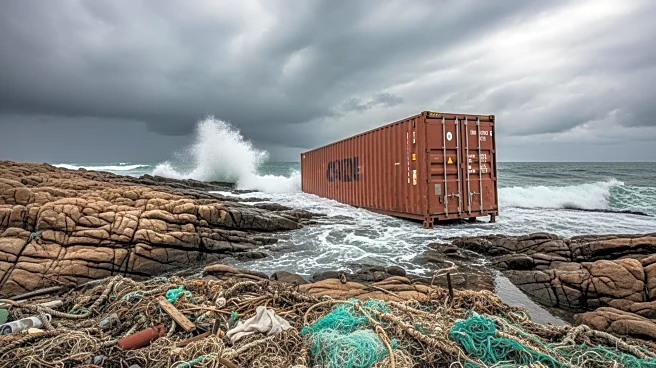What's Happening?
The MSC Baltic III, a boxship that ran aground in Lark Harbour, Newfoundland, is facing increasing damage due to severe winter weather conditions. Heavy wave action has exacerbated the ship's structural
deterioration, raising fears of environmental pollution. Local fishermen and residents are concerned that the vessel may break apart, releasing debris and pollutants into the coastal waters. The Canadian Coast Guard has assessed the damage, noting structural issues below deck. Salvage operations have been hindered by the weather, and a full-scale removal is unlikely until spring.
Why It's Important?
The situation poses a significant risk to the local environment and economy, particularly the fishing industry, which is vital to Newfoundland's coastal communities. The potential release of pollutants could harm marine life and disrupt fisheries, impacting livelihoods and food security. The delay in salvage operations due to weather conditions highlights the challenges of responding to maritime accidents in harsh environments. The incident underscores the need for effective disaster preparedness and response strategies to protect coastal ecosystems and communities.
What's Next?
Salvage operations are expected to resume once weather conditions improve, with a full-scale removal planned for spring. The Canadian Coast Guard and contracted salvor T&T Salvage will continue to assess the vessel's condition and address any immediate threats. Local stakeholders may push for faster progress on infrastructure improvements, such as access roads, to facilitate salvage efforts. The incident may prompt discussions on improving maritime safety regulations and response capabilities in the region.
Beyond the Headlines
The grounding of the MSC Baltic III highlights broader issues related to maritime safety and environmental protection. The incident may lead to increased scrutiny of shipping practices and regulations, particularly in ecologically sensitive areas. The potential environmental impact raises ethical considerations about the responsibility of shipping companies and governments to prevent and mitigate maritime accidents. Long-term, the situation could influence policy changes aimed at enhancing coastal resilience and disaster response capabilities.









